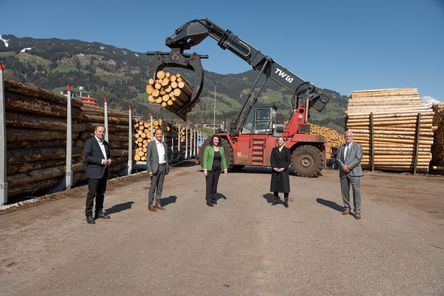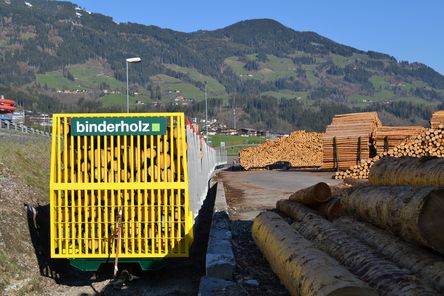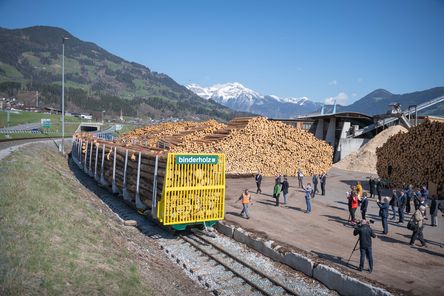21.04.2021
NewsThe wood is taking the rail
Shifting freight transport from road to rail is an essential objective that the Tyrolean state government has set itself. A next regional step in this direction was presented today, Wednesday, in Fügen by Deputy State Governors LHStv Josef Geisler and LHStvin Ingrid Felipe together with representatives of the Zillertalbahn railway, the company Binderholz and the Austrian national railway company ÖBB.
Since the beginning of the year in trial operation and from mid-May in regular operation, the logs arriving by railway in Jenbach at the newly built freight loading terminal, are moved with a loading excavator on specially adapted wagons of the Zillertalbahn railway and then transported to Fügen for processing. LHStv Geisler and LHStvin Felipe are enthusiastic about the on-site inspection: "Thanks to the good cooperation between the participating companies in the project planning and implementation of the innovative transport system, it has been possible to enable a sustainable shift from road to rail. This will lead to a noticeable reduction in traffic and a corresponding relief for the population along the B 169 Zillertalstraße road. This means that not only the companies involved, but also the environment and air quality will benefit by avoiding 20,000 truck journeys per year."
Concept for efficient transport
Up to December 2013, the Zillertalbahn railway had already carried out freight transports on behalf of Binderholz between Jenbach and Fügen. However, the transport system at the time was costly and labor-intensive, so it was discontinued. In 2020, a new start to rail transport was launched, as the technical director of the Zillertaler Verkehrsbetriebe (ZVB), Helmut Schreiner, reports: "The shifting of timber transport to the Zillertalbahn represents a win-win situation for all project participants and is the result of excellent cooperation between all stakeholders." The transport system, which is now in operation, was developed by the Styrian company Innofreight especially for the narrow-gauge railway and consists of special superstructures, which are mounted on the supporting wagons of the ZVB and transport three sets of ten wagons each to Fügen for further processing at full capacity. As Managing Director Reinhard Binder explains, the new delivery concept is entirely in line with the company's mission statement: "This way, we will permanently relieve the traffic on the Zillertalstraße road. In addition, moving the transport to the railways sustainably strengthens our successful sawmill site in Fügen."
A flagship project as a model
In addition to the ZVB with an investment of one million euros and the company Binderholz with 1.5 million euros, also the State Tyrol, ÖBB-Infra, Rail Cargo Austria, Innofreight Solutions and the Schieneninfrastruktur Gesellschaft (SCHIG) were involved in the implementation as project partners. "Binderholz has been relying on the railways with us for many years. The current project shows impressively what we can move together with the ZVB for the customer; this is sustainable end-to-end logistics all the way to the factory," emphasises Judith Fiala, theresponsible head of business unit at ÖBB Rail CargoGroup. After the test phase with the prototype, which was completed in January, the 30 wagons required for full utilisation were ordered. These have already been delivered and are ready for use at the ZVB terminal in Jenbach. Transport officer LHStvin Felipe draws the comparison to public transport: "It is important that we create services that also cover the famous "last mile" in rail freight transport, thus shifting many truck journeys from road to rail. We pursue this goal regionally as well as in the Zillertal valley, but also at European level, of course, because only in this way will we achieve a noticeable relief on Tyrol's roads in the long term."
Important building block for mobility in the Zillertal
For LHStv Geisler, the shift of timber transport from road to rail is an important building block for mobility in the Zillertal: "Together with the Fügen bypass and the further strengthening of the Zillertalbahn railway as the backbone of mobility in the Zillertal valley, this initiative brings a significant relief for the population, especially in the particularly busy front part of the Zillertal valley."






